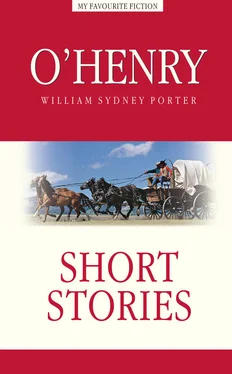Esteban hobbled to Mr Hemstetter’s store, and bought shoes. Coming out, he swaggered down the street with impunity, reviling loudly the bugs of the devil. The suffering ones sat up or stood upon one foot and beheld the immune barber. Men, women and children took up the cry: “ ЎZapatos! zapatos! ”
The necessity for the demand had been created. The demand followed. That day Mr Hemstetter sold three hundred pairs of shoes.
“It is really surprising,” he said to Johnny, who came up in the evening to help him straighten out the stock, “how trade is picking up. Yesterday I made but three sales.”
“I told you they’d whoop things up when they got started,” said the consul.
“I think I shall order a dozen more cases of goods, to keep the stock up,” said Mr Hemstetter, beaming through his spectacles.
“I wouldn’t send in any orders yet,” advised Johnny. “Wait till you see how the trade holds up.”
Each night Johnny and Keogh sowed the crop that grew dollars by day. At the end of ten days two-thirds of the stock of shoes had been sold; and the stock of cockleburrs was exhausted. Johnny cabled to Pink Dawson for another 500 pounds, paying twenty cents per pound as before. Mr Hemstetter carefully made up an order for $1500 worth of shoes from Northern firms. Johnny hung about the store until this order was ready for the mail, and succeeded in destroying it before it reached the postoffice.
That night he took Rosine under the mango tree by Godwin’s porch, and confessed everything. She looked him in the eye, and said: “You are a very wicked man. Father and I will go back home. You say it was a joke? I think it is a very serious matter.”
But at the end of half an hour’s argument the conversation had been turned upon a different subject. The two were considering the respective merits of pale blue and pink wall-paper with which the old colonial mansion of the Atwoods in Dalesburg was to be decorated after the wedding.
On the next morning Johnny confessed to Mr Hemstetter. The shoe merchant put on his spectacles, and said through them: “You strike me as being a most extraordinary young scamp. If I had not managed this enterprise with good business judgment my entire stock of goods might have been a complete loss. Now, how do you propose to dispose of the rest of it?”
When the second invoice of cockleburrs arrived Johnny loaded them and the remainder of the shoes into schooner, and sailed down the coast to Alazan. There, in the same dark and diabolical manner, he repeated his success: and came back with a bag of money and not so much as a shoestring.
And then he besought his great Uncle of the waving goatee and starred vest to accept his resignation, [10]for the lotus no longer lured him. He hankered for the spinach and cress of Dalesburg.
The services of Mr William Terence Keogh as acting consul, pro term., were suggested and accepted, and Johnny sailed with the Hemstetters back to his native shores.
Keogh slipped into the sinecure of the American consulship with the ease that never left him even in such high places. The tintype establishment was soon to become a thing of the past, although its deadly work along the peaceful and helpless Spanish Main was never effaced. The restless partners were about to be off again, scouting ahead of the slow ranks of Fortune. But now they would take different ways. There were rumors of a promising uprising in Peru; and thither the martial Clancy would turn his adventurous steps. As for Keogh, he was figuring in his mind and on quires of Government letter-heads a scheme that dwarfed the art of misrepresenting the human countenance upon tin.
“What suits me,” Keogh used to say, “in the way of a business proposition is something diversified that looks like a longer shot than it is – something in the way of a genteel graft that isn’t worked enough for the correspondence schools to be teaching it by mail. I take the long end; but I like to have at least as good a chance to win as a man learning to play poker on an ocean steamer, or running for governor of Texas on the Republican ticket. And when I cash in my winnings I don’t want to find any widows’ and orphans’ chips in my stack.”
The grass-grown globe was the green table on which Keogh gambled. The games he played were of his own invention. He was no grubber after the diffident dollar. Nor did he care to follow it with horn and hounds. Rather he loved to coax it with egregious and brilliant flies from its habitat in the waters of strange streams. Yet Keogh was a business man; and his schemes, in spite of their singularity, were as solidly set as the plans of a building contractor. In Arthur’s time Sir William Keogh would have been a Knight of the Round Table. In these modern days he rides abroad, seeking the Graft instead of the Grail.
Three days after Johnny’s departure, two small schooners appeared off Coralio. After some delay a boat put off from one of them, and brought a sunburned young man ashore. This young man had a shrewd and calculating eye; and he gazed with amazement at the strange things that he saw. He found on the beach some one who directed him to the consul’s office; and thither he made his way at a nervous gait.
Keogh was sprawled in the official chair, drawing caricatures of his Uncle’s head on an official pad of paper. He looked up at his visitor.
“Where’s Johnny Atwood?” inquired the sunburned young man, in a business tone.
“Gone,” said Keogh, working carefully at Uncle Sam’s necktie.
“That’s just like him,” remarked the nut-brown one, leaning against the table. “He always was a fellow to gallivant around instead of ’tending to business. Will he be in soon?”
“Don’t think so,” said Keogh, after a fair amount of deliberation.
“I s’pose he’s out at some of his tomfoolery,” conjectured the visitor, in a tone of virtuous conviction. “Johnny never would stick to anything long enough to succeed. I wonder how he manages to run his business here, and never be ’round to look after it.”
“I’m looking after the business just now,” admitted the pro term. consul.
“Are you – then, say – where’s the factory?”
“What factory?” asked Keogh, with a mildly polite interest.
“Why, the factory where they use them cockleburrs. Lord knows what they use ’em for, anyway! I’ve got the basements of both them ships out there loaded with ’em. I’ll give you a bargain in this lot. I’ve had every man, woman and child around Dalesburg that wasn’t busy pickin’ ’em for a month. I hired these ships to bring ’em over. Everybody thought I was crazy. Now, you can have this lot for fifteen cents a pound, delivered on land. And if you want more I guess old Alabam’ can come up to the demand. Johnny told me when he left home that if he struck anything down here that there was any money in he’d let me in on it. Shall I drive the ships in and hitch?”
A look of supreme, almost incredulous, delight dawned in Keogh’s ruddy countenance. He dropped his pencil. His eyes turned upon the sunburned young man with joy in them mingled with fear lest his ecstasy should prove a dream.
“For God’s sake tell me,” said Keogh, earnestly, “are you Dink Pawson?”
“My name is Pinkney Dawson,” said the cornerer of the cockleburr market.
Billy Keogh slid rapturously and gently from his chair to his favorite strip of matting on the floor.
There were not many sounds in Coralio on that sultry afternoon. Among those that were may be mentioned a noise of enraptured and unrighteous laughter from a prostrate Irish-American, while a sunburned young man, with a shrewd eye, looked on him with wonder and amazement. Also the “tramp, tramp, tramp” of many well-shod feet in the streets outside. Also the lonesome wash of the waves that beat along the historic shores of the Spanish Main.
Читать дальше
Конец ознакомительного отрывка
Купить книгу












